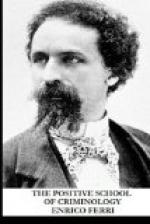No man can set up any absolute standard in this matter. Giovanni Bovio thus arrived at the conclusion that this internal contradiction in the science of criminology was the inevitable fate of human justice, and that this justice, struggling in the grasp of this internal contradiction, must turn to the civil law and ask for help in its weakness. The same thought had already been illumined by a ray from the bright mind of Filangieri, who died all too soon. And we can derive from this fact the historical rule that the most barbarian conditions of humanity show a prevalence of a criminal code which punishes without healing; and that the gradual progress of civilization will give rise to the opposite conception of healing without punishing.
Thus it happens that this university of Naples, in which the illustrious representative of the classic school of criminology realized the necessity of its regeneration, and in which Bovio foresaw its sterility, has younger teachers now who keep alive the fire of the positivist tendency in criminal science, such as Penta, Zuccarelli, and others, whom you know. Nevertheless I feel that this faculty of jurisprudence still lacks oxygen in the study of criminal law, because its thought is still influenced by the overwhelming authority of the name of Enrico Pessina. And it is easy to understand that there, where the majestic tree spreads out its branches towards the blue vault, the young plant feels deprived of light and air, while it might have grown strong and beautiful in another place.
The positive school of criminology, then, was born in our own Italy through the singular attraction of the Italian mind toward the study of criminology; and its birth is also due to the peculiar condition our country with its great and strange contrast between the theoretical doctrines and the painful fact of an ever increasing criminality.




